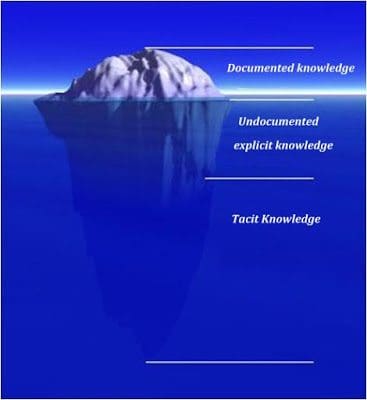
Favorite One of David Snowden’s principles is that “Knowledge can’t be conscripted, it can only be volunteered”. However waiting passively for voluntary contributions is the wrong way to spread knowledge. Ask for volunteers instead. I Know The Answer!Originally uploaded by ngader Knowledge can’t be conscripted, it can only be volunteered,
Read More
 Shared by Nick Milton March 2, 2022
Shared by Nick Milton March 2, 2022

Favorite In 2008 David Snowden published a landmark article on 7 KM principle, mainly focusing on the supply side of knowledge management. The post below, upcycled from 2012, aims to present similar principles from the demand side. Principles by Nick Youngson CC BY-SA 3.0 Alpha Stock Images David’s 2008 post is currently (Nov
Read More
 Shared by Nick Milton November 9, 2020
Shared by Nick Milton November 9, 2020
Favorite Collaboration adds simplicity in a complicated world. Simplifying through collaboration is the topic of a Ted talk by Yves Morieux, embedded below, in which he gives us 6 rules to simplify work. Watch the talk to get the context, but here are his 6 rules (with more explanation here)
Read More
 Shared by Nick Milton August 9, 2019
Shared by Nick Milton August 9, 2019

Favorite A recent McKinsey article, if you read it carefully, suggests that the core KM behaviours for group effectiveness are Asking and Responding. The McKinsey article entitled Givers take all: The hidden dimension of corporate culture is a really interesting article, describing a study by Harvard psychologists of the US intelligence
Read More
 Shared by Nick Milton May 24, 2018
Shared by Nick Milton May 24, 2018

Favorite Last week I described a “Pull cycle” for knowledge – let’s now look at the feedback loops in that cycle. You can find description of the cycle here. This is a cycle based on knowledge demand (unlike the supply-side cycles you normally see) and includes the following steps; The
Read More
 Shared by Nick Milton February 7, 2018
Shared by Nick Milton February 7, 2018

Favorite Even in the most progressive organisations, sometimes the boss needs to drive a “culture of asking.” Here is how Elon Musk did it. Image from wikimedia commons Musk’s email is quoted here, and seems to have been sent in response to a dissatisfaction with default communication and knowledge sharing
Read More
 Shared by Nick Milton February 5, 2018
Shared by Nick Milton February 5, 2018

Favorite We are used to seeing pictures of knowledge cycles, but there is one cycle you never see, and it’s very important. You can find very many versions of the knowledge cycle, and they all seem to work the same way. They start with “Create” or “Capture”, and progress through
Read More
 Shared by Nick Milton January 29, 2018
Shared by Nick Milton January 29, 2018

Favorite The KM iceberg is a common image, but what does it really mean? The Iceberg is a very familiar model within Knowledge Management, seen in many slide presentations. I first used it myself in the public domain, in an article in Knowledge management magazine, 2000, entitled “Mining the deep knowledge
Read More
 Shared by Nick Milton September 11, 2017
Shared by Nick Milton September 11, 2017
Favorite Community of practice members may start by being learners and end up being teachers who still learn. Let’s look at patterns of behaviour in a Community of Practice forum, or discussion area. When a novice employee is very new to an organisation or to a topic, they are usually
Read More
 Shared by Nick Milton July 28, 2017
Shared by Nick Milton July 28, 2017
Favorite If you agree with me that the greatest value in organisational online discussion comes through answering questions, then Yammer’s default prompt does not help. “What are you working on?” asks Yammer – as a work-related version of the Facebook question “What’s on your mind”. As a way of getting
Read More
 Shared by Nick Milton July 18, 2017
Shared by Nick Milton July 18, 2017
![]() Shared by Nick Milton March 2, 2022
Shared by Nick Milton March 2, 2022






